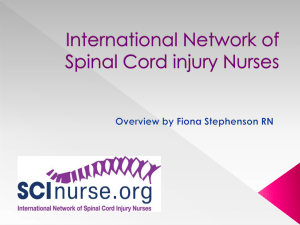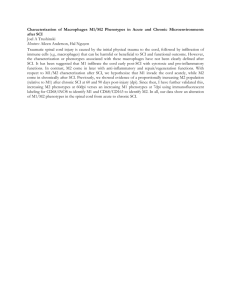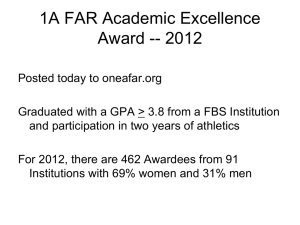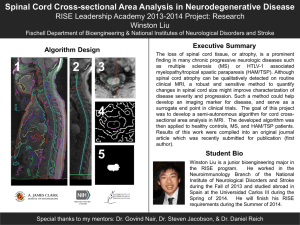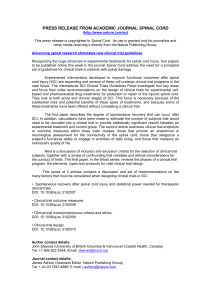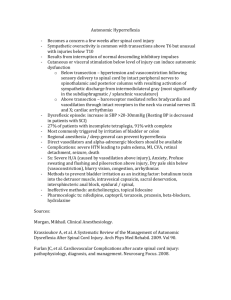1 physical medicine and rehabilitation spinal cord injury medicine
advertisement
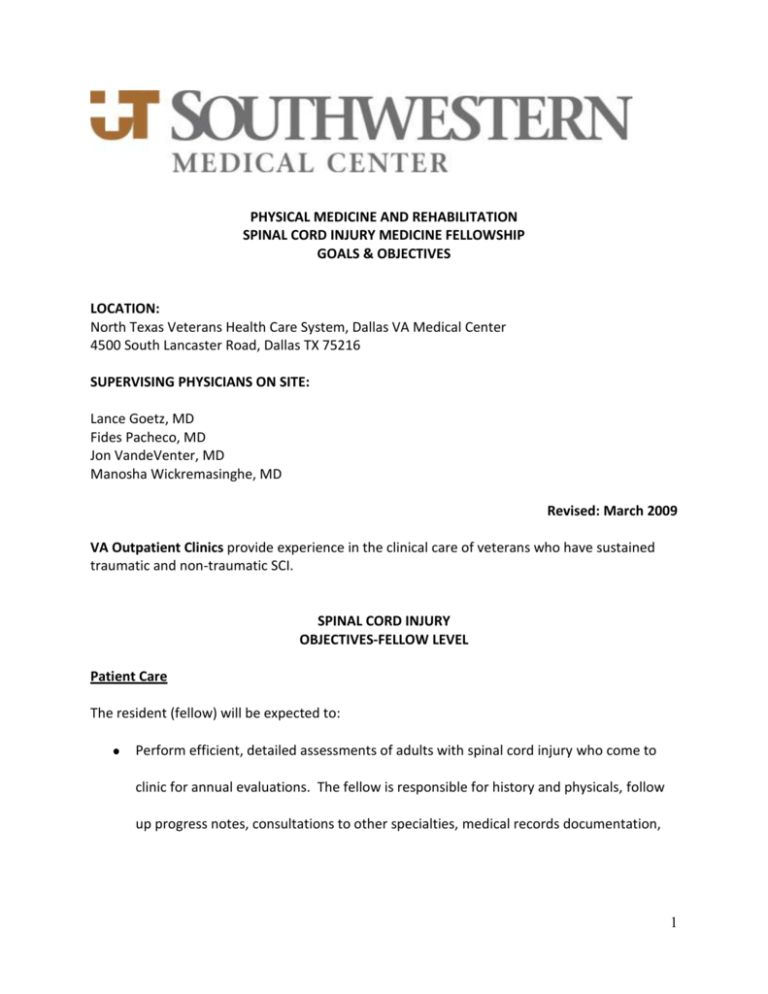
PHYSICAL MEDICINE AND REHABILITATION SPINAL CORD INJURY MEDICINE FELLOWSHIP GOALS & OBJECTIVES LOCATION: North Texas Veterans Health Care System, Dallas VA Medical Center 4500 South Lancaster Road, Dallas TX 75216 SUPERVISING PHYSICIANS ON SITE: Lance Goetz, MD Fides Pacheco, MD Jon VandeVenter, MD Manosha Wickremasinghe, MD Revised: March 2009 VA Outpatient Clinics provide experience in the clinical care of veterans who have sustained traumatic and non-­‐traumatic SCI. SPINAL CORD INJURY OBJECTIVES-­‐FELLOW LEVEL Patient Care The resident (fellow) will be expected to: Perform efficient, detailed assessments of adults with spinal cord injury who come to clinic for annual evaluations. The fellow is responsible for history and physicals, follow up progress notes, consultations to other specialties, medical records documentation, 1 orders for medications and supplies, detailed consultations to interdisciplinary team members, and interdisciplinary conference and patient/family conference summaries. Diagnose physical, cognitive and psychosocial impairments in adult rehabilitation patients with spinal cord injury. Act as consultant to other services for care of spinal cord injured patients. Create comprehensive medical rehabilitation problem lists and treatment plans for adult patients with spinal cord injury. Determine appropriate rehabilitaƚŝŽŶƐĞƌǀŝĐĞƐďĂƐĞĚŽŶƚŚĞƉĂƚŝĞŶƚ͛ƐƉŽƐŝƚŝŽŶŝŶƚŚĞ continuum of care, and direct placement into inpatient rehabilitation, outpatient rehabilitation, long term care, or hospice, as needed. Write consults to therapists outlining patient history, problems to be addressed, and clearly defined precautions. Efficiently evaluate and formulate treatment plans for medical complications in veteran SCI population. Demonstrate knowledge of preventative strategies to minimize complications for such population. Create comprehensive differential diagnoses for abnormal physical examination findings in persons with SCI. Be able to prescribe appropriate equipment needs including seating, orthotics, and assistive technologies. Provide care to the dual diagnosis veteran patient (brain injury and spinal cord injury). 2 Procedural Skills: Demonstrate proficiency with botulinum neurotoxin and other neuromuscular blockade procedures in the adult spinal cord injury population. Understand safe handling and preparation of the material, indications and contraindications for use. Demonstrate proficiency with management of patients with intrathecal baclofen pump including the evaluation, dosing, and pump interrogation techniques in children and adult patients who have spinal cord injury and other disorders of tone. Be able to outline mobility and self care challenges based on neurological level of injury. Medical Knowledge The SCI Fellow will be expected to: Evaluate patients with non-­‐traumatic myelopathies, and know the differential diagnosis for myelopathy. Describe the problems associated with the dual diagnosis patient (spinal cord injury and brain injury). Describe the clinical presentation and management of patients with syringomyelia. Assess respiratory dysfunction in spinal cord disorders. Recognize prophylactic and therapeutic strategies for thromboembolic disease in the SCI patient. Use current guidelines for treatment of venous thromboembolism. Apply principles of primary care for persons with spinal cord injury. ĞƐĐƌŝďĞǁŽŵĞŶ͛ƐŚĞĂůƚŚĐŚĂůůĞŶŐĞƐĂĨƚĞƌƐƉŝŶĂůĐŽƌĚŝŶũƵƌLJ͘ Describe sexuality issues and options for male patients with SCI. 3 Be able to outline differences in seating principles for manual and power wheelchairs. Be able to outline differences in seating for persons with high tetraplegia, low tetraplegia/high paraplegia and low paraplegia. Understand the medical problems of SCI and treatment, including but not limited to: bowel, bladder, pulmonary, skin, nutrition, autonomic dysreflexia/hyperreflexia (AD/AH), deep venous thrombosis (DVT)/pulmonary embolism (PE), hypercalcemia, temperature regulation, orthostatic hypotension, latex allergy, spasticity. Practice-­‐Based Learning and Improvement The SCI Fellow will be expected to: Locate, appraise and assimilate evidence from the scientific literature into daily practice. hƐĞƚŚĞĂǀĂŝůĂďůĞŵĞĚŝĐĂůůŝƚĞƌĂƚƵƌĞƚŽĞǀĂůƵĂƚĞŽŶĞ͛ƐƉĂƚŝĞŶƚĐĂƌĞƉƌĂĐƚŝĐĞ͘/ĚĞŶƚŝĨLJ gaps in medical knowledge pertaining to persons with SCI. Perform independent, focused medical database searches. Educate residents in this regard. Assess appropriateness and cost-­‐effectiveness of diagnostic testing and how it affects patient treatment, outcomes, and overall patient management. Understand healthcare utilization issues in relation to diagnostic testing and therapy. Identify adverse outcomes from past medical and rehabilitation treatment decisions and alter future treatment where appropriate. Utilize evidence-­‐based guidelines in treatment whenever feasible. Interpersonal and communication Skills The SCI fellow will be expected to: Understand psychosocial, educational and vocational issues in SCI. Interface/communicate effectively with interdisciplinary (IDT) team members and professionals outside the IDT related to these issues. Utilizing best evidence regarding outcomes after acute SCI, counsel patients with SCI and their families regarding prognosis. Discuss sexuality concerns with patients and partners. 4 DĂŝŶƚĂŝŶĂďĂůĂŶĐĞŽĨĐŽŵƉĂƐƐŝŽŶĂŶĚŚŽŶĞƐƚLJ͕ĂŶĚƌĞƐƉĞĐƚƉĂƚŝĞŶƚ͛ƐŚŽƉĞƐĂŶĚ spiritual perspectives. Communicate clearly and effectively with persons with SCI and their families. Exhibit empathy and understanding. Counsel patients with SCI and their families regarding outpatient rehabilitation goals. Obtain consultation as appropriate and write detailed consult requests which identify relevant issues. Present mini lectures to residents and or medical students on this rotation. Utilize effective listening skills in interdisciplinary meetings and one-­‐on-­‐one interactions. Professionalism The SCI fellow will be expected to: Complete outpatient visits and charting in a timely manner. Take responsibility for completion of notes. Be sensitive to cultural differences and needs of persons with SCI, their families, and other members of the interdisciplinary team. Arrive on time for lectures and rounds. Apply sound ethical principles in practice including patient confidentiality, informed consent and provisions of withholding care. Be aware of disability rights perspectives on life-­‐sustaining treatment. Exhibit appropriate dress and behavior. Communicate relevant medical information with other providers for patients moving into different care settings. Advocate strongly and effectively for patients. Assist them in their interactions with other health care providers and in other settings in order to optimize health and wellness. 5 Systems-­‐based Practice The SCI fellow will be expected to: Be familiar with the SCI Unit multi-­‐disciplinary team as a role model for spinal cord injury care. Coordinate care with other specialists involved in SCI scare, such as urology and neurological surgery. Describe VA Model System for SCI care. Resources 1. Lin, V. et al Spinal Cord Medicine: Principles and Practice (text) 2. Kirshblum, Spinal Cord Medicine (text) 3. Molnar, Pediatric Rehabilitation, SCI chapter and other chapters as suggested by Dr. McDonald 4. Relevant literature provided or suggested by supervising physicians End of Document Prepared by: Lance L. Goetz, M.D and Samuel M. Bierner, M.D. Email: lgoetz@mednet.swmed.edu Samuel.Bierner@utsouthwestern.edu This document is subject to periodic revision. The version available online at the UTSouthwestern web site is the most current version. . 6 7
